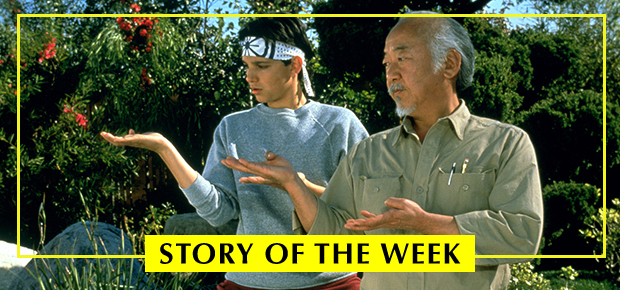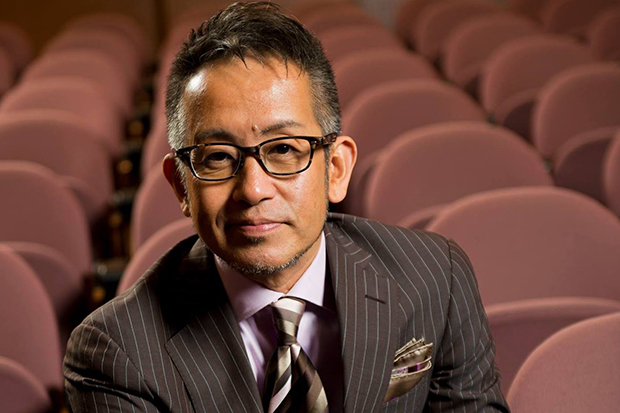
(© Columbia Pictures)
With a seemingly inexhaustible stream of screen-to-stage musical adaptations in the works, another drop was added to the flow with the announcement of The Karate Kid. Based on the popular 1984 martial arts film, The Karate Kid has serious brand recognition — but does it sing?
I'll examine that question and the musical's prospects in this Story of the Week.
What is The Karate Kid?
If you're asking this question, chances are you are older than 55, or younger than 15; because for Gen-Xers and millennials, The Karate Kid is assumed knowledge. The original film came out in 1984 and was a surprise hit at the box office, returning its $8 million budget many times over. It spawned multiple sequels, video games, and a general surge in interest in martial arts training. "Never in my wildest dreams did I think this little movie would reach across generations the way it has," said screenwriter Robert Mark Kamen in a press statement. Kamen is signed on to write the book of the musical.
The film tells the story of Daniel LaRusso (Ralph Macchio), a New Jersey teenager cruelly relocated to California's San Fernando Valley after his mother accepts a new job. His scrawny physique and ethnic looks make him an immediate target for Aryan muscle-head Johnny Lawrence (William Zabka), especially after Daniel starts hanging around Johnny's ex-girlfriend, Ali Mills (Elisabeth Shue). Johnny is a black belt at the Cobra Kai dojo, which is run by an emotionally damaged Vietnam vet (Martin Kove) who trains his students to be ruthless with their opponents. One day, when Johnny and his Cobra Kai gang are wailing on Daniel, the mysterious Mr. Miyagi (Pat Morita) intervenes to save him. Daniel asks Miyagi to teach him karate so he can defend himself. After some initial reluctance (and a slight from the sensei of Cobra Kai), Miyagi agrees and begins to train Daniel for the All-Valley Karate Championships.
The film is a fairly standard sports drama, complete with a charming underdog, musical training montages, and an adrenaline-rush of a climax. This is a classic formula that The Karate Kid exploits well onscreen. Could it conjure that same magic onstage?
Why is it becoming a musical?
Why does anything become a musical these days? The producers think the property is popular enough that fans will shell out in excess of $100 to see a story they already know reworked for contemporary political sensibilities, with a bunch of new songs shoved in. The Karate Kid is certainly not the worst candidate for this treatment. Done right, the show might even be good!

(© facebook.com/AmonMiyamotoOfficial/)
"Many people love Broadway musicals for 'escape' — but I love them because they provide insight into how we should live our lives," said director Amon Miyamoto, who makes his first return to Broadway since helming the spectacular 2004 revival of Stephen Sondheim's Pacific Overtures (he was almost certainly not thinking about Sweeney Todd, Gypsy, or Assassins when he made this statement). Miyamoto plans to tell the story of The Karate Kid through "a visual and movement style unseen on Broadway," and this is the aspect of the musical about which I am most hopeful.
Any story about physical combat offers fertile ground for a choreographer. The stage adaptation of Rocky seems like the most obvious precursor to The Karate Kid in this regard. That 2014 musical aimed for brutal realism in its fight sequences, turning the Winter Garden Theatre into a boxing arena. The Karate Kid could go a different route, inventing movement that stylizes violence without tricking our eyes into believing that actual violence is occurring — I hope it's an opportunity the creative team seizes.
The Karate Kid will feature choreography from husband-and-wife team Keone and Mari Madrid, whose mastery of contemporary street dance promises to unleash a style of movement rarely seen on the Broadway stage (you can see an example of their work above). One can easily imagine how this kind of dance could be used to suggest karate while simultaneously expanding the lexicon of dance on Broadway.
The Madrids are also the choreographers attached to the Britney Spears musical Once Upon a One More Time, which debuts in Chicago this April and is rumored to have booked a Broadway house for the summer.
But what about the music?
Meet 33-year-old composer Drew Gasparini, who is signed on to pen the score to The Karate Kid. While Gasparini has several projects in the works (including two with Broadway star Alex Brightman as writing partner), his biggest claim to fame thus far is writing the score to the Super Bowl advertising stunt Skittles Commercial: The Broadway Musical (I didn't see it, but my colleague Hayley Levitt assures me that the music was boppy).
Before that, Gasparini's debut musical Crazy, Just Like Me won the New York Musical Festival's 2011 "Best of Fest" Award. TheaterMania critic Dan Bacalzo offered high praise for the score in his review, and was especially impressed by a lyrical reference to the then-fledgling gay dating app Grindr in a song titled "Straight Girl Problems."
Gasparini has an extensive YouTube page full of Broadway stars singing his music, and I've really enjoyed what I've heard so far. He has a pop sensibility reminiscent of Ben Folds, and a talent for brusquely honest lyrics — all things that could absolutely benefit a Karate Kid musical.
So will The Karate Kid be a hit?
One never can tell. Following the disappointments of screen-to-stage adaptations like Pretty Woman and King Kong, it's easy to foresee a pessimistic trajectory for a show like The Karate Kid: It opens to mocking reviews, it quickly exhausts its built-in audience, ticket sales slump, and bloggers write insipid hot takes about "cultural appropriation" as a final kick to the shins before the show is unceremoniously yanked off stage.
But such predictions ignore screen-to-stage transfers like Beetlejuice, which has managed to find a real audience despite its impending doom. And let's not forget that The Band's Visit, which won the 2018 Tony for Best Musical, started as a movie. So did Kinky Boots (2013) and Once (2012). All of these shows were successful because they found a theatrical voice beyond their original films. If The Karate Kid manages to do that, it could actually end up a critical and commercial success. It may not sweep the Tonys, but it might just sweep the leg.








